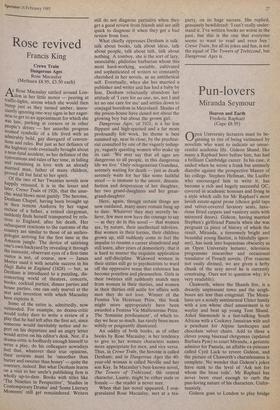Rose revived
Francis King
As Rose Macaulay rattled around Lon-
don in her little motor — peering at traffic-lights, across which she would then bump just as they turned amber, insou- ciantly ignoring one-way signs in her eager- ness to get to an appointment for which she was late, parking at corners or in other people's drives — her anarchic progress seemed symbolic of a life lived with an admirably bold, gay disregard of conven- tions and rules. But just as her defiance of the highway code eventually brought about a near-fatal accident, so her defiance of the conventions and rules of her time, in falling and remaining in love with an already married man, father of many children, proved all but fatal to her spirit.
Of the two of her Twenties novels now happily reissued, it is in the lesser and later, Crewe Train of 1926, that the anar- chic wind blows most gustily. The heroine, Denham Chapel, having been brought up in then remote Andorra by her vague recluse of a father, a retired clergyman, suddenly finds herself transported by rela- tives to England, after his death. Her subsequent reactions to the customs of the Country are similar to those of an anthro- pologist arriving for the first time in the Amazon jungle. The device of satirising One's own backyard by revealing it through the innocent, observant eyes of a first-time visitor is not, of course, new — James Morier used it with notable success in his Haiji Baba in England (1828) — but, as Denham is introduced to a puzzling, dis- concerting world of theatres, concerts, books, cocktail parties, dinner parties and house parties, one can only marvel at the zest and invention with which Macaulay here exploits it.
Some of the satire is, admittedly, now outmoded. For example, no drama-critic would today dare to write a review of a play that he had left after the first act, since someone would inevitably notice and re- port on his departure and an angry letter would arrive on his editor's desk. Nor, if a drama-critic is foolhardy enough himself to write a play, do his colleagues nowadays feel that, whatever their true opinions, their reviews must be `smoother than butter and sweeter than honey' — quite the contrary, indeed. But what Denham learns on a visit to her uncle's publishing firm is wholly up-to-date. Books with titles like The Nineties in Perspective', `Studies in Contemporary Drama' and 'Some Literary Moments' still get remaindered. Writers
still do not diagnose partiality when they get a good review from friends and are still quick to diagnose it when they get a bad review from foes.
What chiefly oppresses Denham is talk: talk about books, talk about ideas, talk about people, talk about talk, talk about nothing. A tomboy, she is the sort of lazy, unsociable, philistine barbarian whom this most hard-working, sociable, cultivated and sophisticated of writers so constantly cherished in her novels, as an antithetical self. Eventually, when she has married a publisher and writer and has had a baby by him, Denham reluctantly abandons her
attitude of `I care for no one, no, not I and let no one care for me' and settles down to conjugal boredom in Metroland. Shades of the prison-house have closed not about the growing boy but about the grown girl. Dangerous Ages, of 1921, is a far less flippant and high-spirited and a far more profoundly felt' work. Its theme is best summed up, near its close, by the psychiat- rist consulted by one of the vaguely unhap- py, vaguely questing women who make up its cast: `We may say that all ages are dangerous to all people, in this dangerous life we live.' Only octogenarian Grandma, serenely waiting for death — just as death serenely waits for her like some faithful steed — is immune to the unrest, dissatis- faction and desperation of her daughter, her two grand-daughters and her great- grand-daughter.
Here, again, though certain things are now outdated, many more remain bang up to date. Whatever they may secretly be- lieve, few men now have the courage to say — as they do in this novel — that women are, by nature, their intellectual inferiors. But women in their forties, their children grown up, still suddenly come to feel the impulse to resume a career abandoned and still learn, after years of domesticity, that it is hard to muster the requisite application and self-discipline. Widowed women in their sixties still go to psychiatrists to ward off the oppressive sense that existence has become pointless and pleasureless. Girls in their twenties still ruthlessly snatch men from women in their thirties, and women in their thirties still settle for affairs with men they do not love. Winner of the Femina Vie Heureuse Prize, this book might more appropriately have been awarded a Femina Vie Malheureuse Prize. The `feminine predicament', of which to- day we hear so much, has rarely been more wittily or poignantly illustrated.
An oddity of both books, as of other books by Rose Macaulay, is her tendency to give to her women characters names more appropriate for men, and vice versa.
Thus, in Crewe Train, the heroine is called Denham; and in Dangerous Ages the 40- year-old woman is called Neville and her son Kay. In Macaulay's best-known novel, The Towers of Trebizond, the central character, Laurie, might be either male or female — the reader is never sure.
When that last novel appeared, I con- gratulated Rose Macaulay, met at a tea- party, on its huge success. She replied, genuinely bewildered: 'I can't really under- stand it. I've written books no worse in the past, but this is the one that everyone seems to want to read and even buy.' Crewe Train, for all its jokes and fun, is not the equal of The Towers of Trebizond, but Dangerous Ages is.














































 Previous page
Previous page